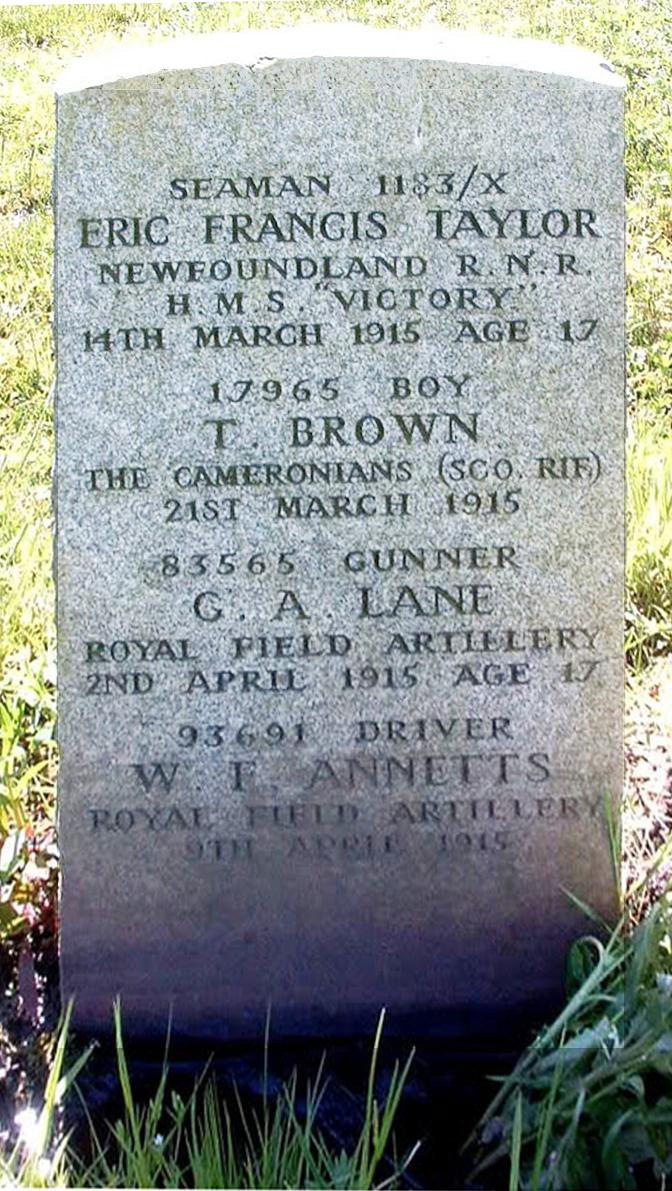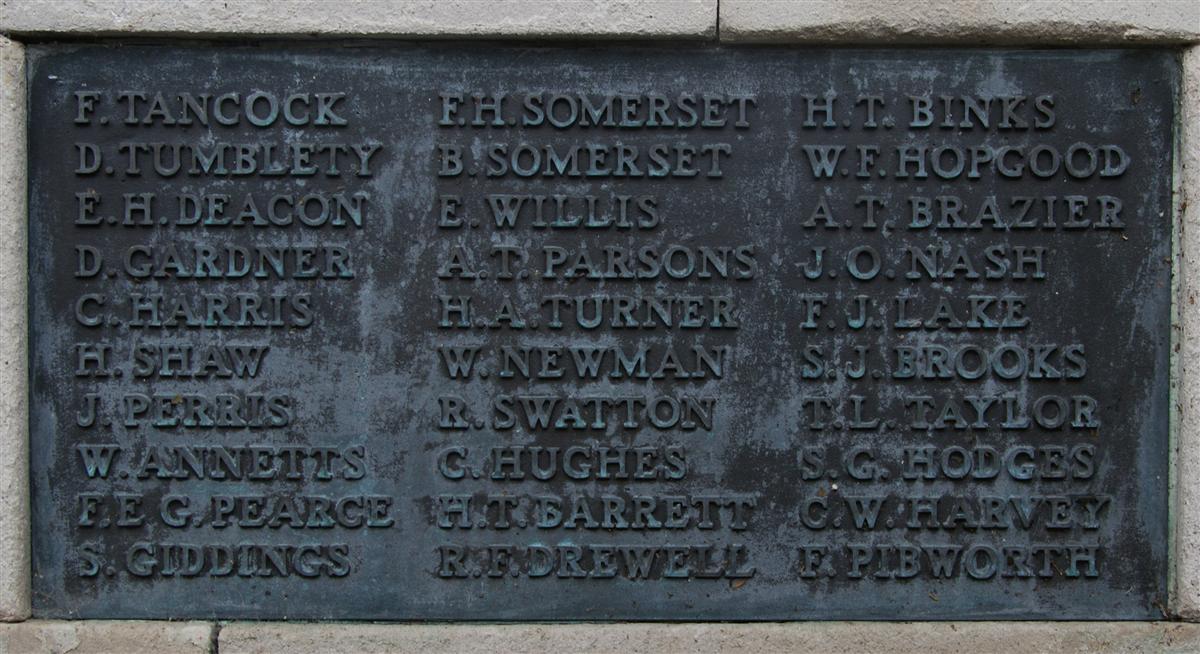William Francis Annetts
Driver 93691 William Francis Annetts, 6 Depot, Royal Field Artillery

William Annett's grave in Glasgow (© Scottish War Graves) |
William was born in Newbury in 1892, the second son of Albert Annetts and his wife Sarah (née Newport). Albert was a sawyer / labourer from Burghclere. At the time of William’s birth the family was living at Greenham Cottages, just outside the Newbury town boundary near Greenham Mills. Around 1897 they moved to 19 Jack Street (also known as Marsh Street and Victoria Street in this period). In 1903 they moved again, by 1911 they were in Pembroke Road and shortly after in Lisle Court (off Wharf Road) as they moved around the back alleys of the town.
In 1911 William married Rose Ellen Williams; their daughter Evelyn was born in 1914. The young family set up home in a cottage at 15 Pembroke Road (aka Rose & Thistle Yard). Sadly William’s mother, Sarah did not see her new grandchild because she had died the previous year.
William’s military records have not survived, so it can only be surmised that he joined the Territorials at the outbreak of war, opting for service with the Royal Field Artillery. It is possible that he was a pre-war Territorial. However, if that were the case, he surely would have been a member of the local RFA battery, which became part of the artillery for the 48th (1st South Midland) Division and went to France in March 1915, or the second line 61st (2nd South Midland) Division. Instead William found himself in Scotland with 6 Depot, RFA, part of the 52nd (Lowland) Division. Either he was up in Scotland immediately pre-war, or he was sent north to make up the numbers. At the outbreak of war the 52nd Division mobilised and moved to their designated positions defending the Scottish coast, 6 Depot was the Glasgow training establishment for the RFA located at the Maryhill Barracks.

William Annett's name on Newbury War Memorial(upper left) |
William was designated as a Driver - in the RFA this was driving horses. While undergoing training William was taken ill; succumbing to acute pneumonia after six days’ illness, at 6am on 9 April 1915.
He was buried in the Glasgow Western Necropolis Cemetery in grave H1444D. Locally he is remembered on Panel 13 of the Newbury Town War Memorial.
His widow, then living in Westbrook, Boxford placed notices in the local paper to mark his passing:
Newbury Weekly News, 22 April 1915 — Deaths
ANNETTS — April 9, at the Military Hospital, Glasgow, Scotland, from double pneumonia, William F Annetts, RFA, the dearly beloved husband of Mrs W F Annetts, Westbrook, Boxford, aged 24 years. The funeral took place at Glasgow on the following Monday, with military honours.
and
MRS W F ANNETTS desires to Thank all kind friends who have shown their sympathy in her sad bereavement.
Westbrook, Boxford, April 19th, 1915
Also on the Newbury memorial, in the upper tier of bronze panels is the name W H Annetts. This is William’s nephew, William Henry, who died in 1943 while serving in the Royal Navy on HMS Fidelity. William Henry was the son of William’s elder brother, Henry (1889-1929), and was born in 1922, perhaps being named in memory of William.
Another of William’s brothers, Arthur George, emigrated to Canada in 1911. He returned to England with the 13th Battalion of the Canadian Expeditionary Force in 1915 and fought on the Western Front. In mid-1915 he was wounded, the news reaching the local paper:
Newbury Weekly News, 10 June 1915 p8 – Local War Notes
Pte A G Annetts, of the Royal Highlanders, Canadian Contingent, wishes his Newbury friends to know that he is alive and going on well, although wounded. He is an inmate of the Beaufort War Hospital, Fishponds, Bristol.
The wound allowed him to spend some time with the family in Newbury:
Newbury Weekly News, 1 July 1915 p8 –Local War Notes
Private Arthur George Annetts, of the Royal Highlanders, Canadian Contingent, called at the NWN office the other morning to chat over his experiences. He is a Newbury lad who went out to Canada four years ago and enlisted when war broke out. He came to England with the 13th Battalion and went to France in February. He has shared in the gallant services of the Canadians, taken his turn in the trenches, been shelled by Germans, been in furious charges and desperate fights. He recalls the fact that on Easter Sunday he was present at a celebration of Holy Communion in a convent, and just at the conclusion a Jack Johnson* tore through the roof, smashing the building. He was in the trenches at Ypres, and was in the fighting line when the Germans resorted to gas fumes. Once a shell burst close by, killing 12 of his comrades, he and another being buried to the neck in earth, but he escaped injury then. He confirms the story of Canadians being crucified by the Germans**, he himself having seen two of his comrades nailed to doors by their hands and feet. At La Bassée, his platoon was heavily shelled. He sprained his spine and was hit in the shoulder by shrapnel. For three days he laid in a wood until they drove the Germans back and rescued the wounded. He was treated in field hospitals, shipped over to England, and sent to Fishponds Hospital at Bristol, which he was able to leave on Friday. He is now convalescing at Newbury.
Arthur survived the war to return to his wife, Rose, in Montreal.
*Jack Johnson - a type of German shell that exploded with a dense black smoke, named after the famous black boxer, Jack Johnson, world heavyweight champion 1908-1915.
** The crucified Canadian was a widespread story at the time, no evidence has ever been found to prove it was true; this suggestion of at least one more instance should probably be treated as propaganda.
Thanks to Karen Newbery for her help researching this casualty.

Find a memorial :
| Died this day: | |
| 02 March 1918 | |
| N G Burgess | |
| Newbury |

Like this site? Show your appreciation through a donation to a great charity.